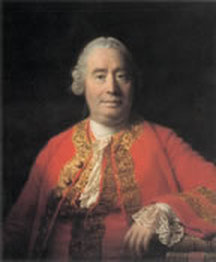David Hume (1711-1776)

David Hume was born in Edinburgh on 26 April 1711. He matriculated at Edinburgh University on 27 February 1723, at the age of eleven, and probably left the University as late as 1726. He took up law, which he abandoned in 1729, worked for a while for a Bristol sugar merchant, and then went to study in France. On his return to Britain he published his first book, A Treatise of Human Nature. Since the Treatise went almost unnoticed, Hume recast it in a more accessible form and in 1741 and 1742 published two volumes of essays. These were a success and resulted in his work being much more widely read. In 1745 he applied for the Chair of Moral Philosophy at the University of Edinburgh. Though his application was unsuccessful, the events surrounding it made his writings better known, and he became a figure of controversy, whose views on religion, morality and philosophy were regarded by many as dangerous.
In 1745 he accepted a post as tutor to the Marquess of Annandale. But the Marquess was insane and so in May 1746, Hume relinquished this position to become secretary to Lieutenant-General James St Clair, whom he served in England and on the Continent for two years.
In 1748, a new edition of his essays appeared, as well as his Philosophical Essays concerning Human Understanding (he changed the first part of the title to ‘An Enquiry’ in 1758). In 1751, he published his Enquiry concerning the Principles of Morals, and in 1752 his Political Discourses. The first collected edition of his Essays and Treatises on Various Subjects appeared in 1753 and the first of what was eventually to be six volumes of his History of England came out in 1754.
From 1758 to 1763, David Hume divided his time between Edinburgh and London, but in 1763, he was appointed Secretary to Lord Hertford in the British Embassy in Paris. He was made Under-Secretary of State, Northern Department, in 1767, a post he held until January 1768, returning in the following year to spend the remainder of his life in Edinburgh preparing new editions of his writings. He died there on 25 August 1776.
Enlightenment Philosophers
- Alexander Gerard ((1728-1795)
- Gershom Carmichael (1672-1729)
- Archibald Campbell (1691-1756)
- Francis Hutcheson (1694-1746)
- Henry Home, Lord Kames (1696-1782)
- Robert Wallace (1697-1771)
- George Turnbull (1698-1748)
- Thomas Reid (1710-1796)
- David Fordyce (1711-1751)
- David Hume (1711-1776)
- James Burnett, Lord Monboddo (1714-1796)
- Hugh Blair (1718-1800)
- George Campbell (1719-1796)
- William Robertson (1721-1793)
- Adam Smith (1723-1790)
- Adam Ferguson (1723-1816)
- John Millar (1735-1801)
- James Beattie (1735-1803)
- Dugald Stewart (1753-1828)
- Archibald Alison (1757-1839)